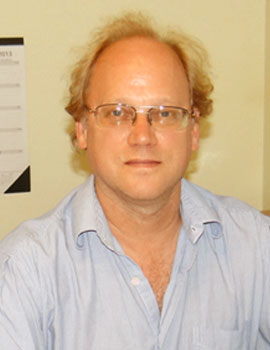
Mark Poch, PhD
Associate Professor
Biology Lab Coordinator
Faculty Email: mpoch@ben.edu
Phone: 630-829-6227
Office Location: Birck 351
BenU faculty since 2013
Courses Taught
General Microbiology, Cell Molecular Biology Laboratory
Mark Poch, Ph.D.
Associate Professor, Biological Sciences
[email protected]
Effect of agricultural/industrial pollution on soil bacterial microbiome and development of antibiotic resistant bacterial strains.
Research
A comparison of the bacterial microbiome found in polluted soil versus control soil will be made to determine numbers and types of bacteria. Additionally, antibiotic-resistance will be tested to determine if polluted soil produces a greater amount of antibiotic resistant bacteria compared to control soil.
The presence of bacteria is important for soil productivity and crop yields. Along with functioning in soil formation and aggregation, bacteria help in the decomposition of complex organics, recycling nutrients and providing nitrogen and sulfur in a usable from for plants. Many studies have shown that pollution of soil by industrial waste, chemical and natural fertilization of agricultural fields can adversely affect the number and types of bacteria that are normally found in soil. Additionally, the presence of industrial waste, heavy metals and fertilizer in soil have shown an increase in antibiotic-resistant bacteria.
This project will make a comparison of bacteria found in a contaminated soil site (ag. agricultural/industrial) compared to a control (eg. forest) site. Soil samples matched with the USDA soil classification system from these two sites will be collected and the number and type of bacteria will be identified (16S RNA sequencing). As many types of bacteria are not easily cultivated on standard agar plates, the soil bacterial microbiome will be determined by Next Generation sequencing of DNA found in the soil (if funding and time permits). Additionally, the antibiotic-resistance of the isolated bacteria will be assessed by the Kirby-Bauer assay and/or PCR analysis for known antibiotic -resistant genes.
Techniques for this project include Microbiological techniques, Kirby-Bauer Assay , DNA isolation, PCR and agarose electrophoresis, NCBI -BLAST and DNA analysis software. Pre-requisitions would include Biology 1199 (Principles of Biology lab) and Biol 3208 (Microbiology with Lab) or equivalent.
Mark Poch, Ph.D.
Associate Professor, Biological Sciences
[email protected]
Effect of agricultural/industrial pollution on soil bacterial microbiome and development of antibiotic resistant bacterial strains.
Research
A comparison of the bacterial microbiome found in polluted soil versus control soil will be made to determine numbers and types of bacteria. Additionally, antibiotic-resistance will be tested to determine if polluted soil produces a greater amount of antibiotic resistant bacteria compared to control soil.
The presence of bacteria is important for soil productivity and crop yields. Along with functioning in soil formation and aggregation, bacteria help in the decomposition of complex organics, recycling nutrients and providing nitrogen and sulfur in a usable from for plants. Many studies have shown that pollution of soil by industrial waste, chemical and natural fertilization of agricultural fields can adversely affect the number and types of bacteria that are normally found in soil. Additionally, the presence of industrial waste, heavy metals and fertilizer in soil have shown an increase in antibiotic-resistant bacteria.
This project will make a comparison of bacteria found in a contaminated soil site (ag. agricultural/industrial) compared to a control (eg. forest) site. Soil samples matched with the USDA soil classification system from these two sites will be collected and the number and type of bacteria will be identified (16S RNA sequencing). As many types of bacteria are not easily cultivated on standard agar plates, the soil bacterial microbiome will be determined by Next Generation sequencing of DNA found in the soil (if funding and time permits). Additionally, the antibiotic-resistance of the isolated bacteria will be assessed by the Kirby-Bauer assay and/or PCR analysis for known antibiotic -resistant genes.
Techniques for this project include Microbiological techniques, Kirby-Bauer Assay , DNA isolation, PCR and agarose electrophoresis, NCBI -BLAST and DNA analysis software. Pre-requisitions would include Biology 1199 (Principles of Biology lab) and Biol 3208 (Microbiology with Lab) or equivalent.
